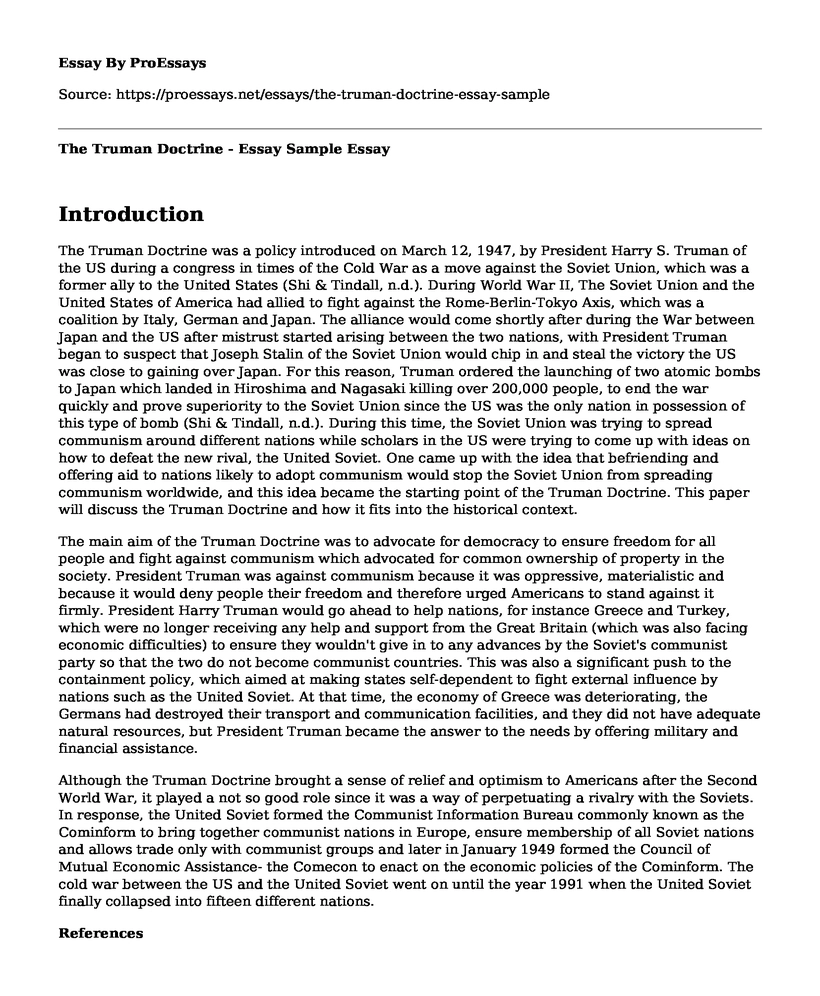Introduction
The Truman Doctrine was a policy introduced on March 12, 1947, by President Harry S. Truman of the US during a congress in times of the Cold War as a move against the Soviet Union, which was a former ally to the United States (Shi & Tindall, n.d.). During World War II, The Soviet Union and the United States of America had allied to fight against the Rome-Berlin-Tokyo Axis, which was a coalition by Italy, German and Japan. The alliance would come shortly after during the War between Japan and the US after mistrust started arising between the two nations, with President Truman began to suspect that Joseph Stalin of the Soviet Union would chip in and steal the victory the US was close to gaining over Japan. For this reason, Truman ordered the launching of two atomic bombs to Japan which landed in Hiroshima and Nagasaki killing over 200,000 people, to end the war quickly and prove superiority to the Soviet Union since the US was the only nation in possession of this type of bomb (Shi & Tindall, n.d.). During this time, the Soviet Union was trying to spread communism around different nations while scholars in the US were trying to come up with ideas on how to defeat the new rival, the United Soviet. One came up with the idea that befriending and offering aid to nations likely to adopt communism would stop the Soviet Union from spreading communism worldwide, and this idea became the starting point of the Truman Doctrine. This paper will discuss the Truman Doctrine and how it fits into the historical context.
The main aim of the Truman Doctrine was to advocate for democracy to ensure freedom for all people and fight against communism which advocated for common ownership of property in the society. President Truman was against communism because it was oppressive, materialistic and because it would deny people their freedom and therefore urged Americans to stand against it firmly. President Harry Truman would go ahead to help nations, for instance Greece and Turkey, which were no longer receiving any help and support from the Great Britain (which was also facing economic difficulties) to ensure they wouldn't give in to any advances by the Soviet's communist party so that the two do not become communist countries. This was also a significant push to the containment policy, which aimed at making states self-dependent to fight external influence by nations such as the United Soviet. At that time, the economy of Greece was deteriorating, the Germans had destroyed their transport and communication facilities, and they did not have adequate natural resources, but President Truman became the answer to the needs by offering military and financial assistance.
Although the Truman Doctrine brought a sense of relief and optimism to Americans after the Second World War, it played a not so good role since it was a way of perpetuating a rivalry with the Soviets. In response, the United Soviet formed the Communist Information Bureau commonly known as the Cominform to bring together communist nations in Europe, ensure membership of all Soviet nations and allows trade only with communist groups and later in January 1949 formed the Council of Mutual Economic Assistance- the Comecon to enact on the economic policies of the Cominform. The cold war between the US and the United Soviet went on until the year 1991 when the United Soviet finally collapsed into fifteen different nations.
References
Shi, D. E., & Tindall, G. B. (n.d.). The Cold War and the Fair Deal, 1945-1952. Retrieved from https://wwnorton.com/college/history/america10/ch/27/documents.aspx?selTab=1#titles
Cite this page
The Truman Doctrine - Essay Sample. (2022, Dec 09). Retrieved from https://proessays.net/essays/the-truman-doctrine-essay-sample
If you are the original author of this essay and no longer wish to have it published on the ProEssays website, please click below to request its removal:
- Levitsky and Way vs. Diamond Debate: Democracy in Recession
- Diplomacy and War - An Analysis of US Iraq War
- Essay Example on Rosa Parks: Beyond the Iconic Bus Ride - Exploring Cultural Myths
- Essay Sample on Lyndon B. Johnson & Cold War: Vietnam War & US Foreign Policy
- Henry Box Brown's Escape From Slavery: A Remarkable Journey - Essay Sample
- Essay Example on 1960s London Working-Class Skinheads: Subculture & Racism
- Great Depression: Finding an Exit Strategy - Essay Sample







